Posts Tagged ‘Chicagoland’
Becoming a US Citizen Removes a Barrier to Justice.
Celebrating the 4th of July for a naturalized citizen can have a different flavor. It is an indescribable feeling of pride, freedom, and belonging. A naturalized citizen is a person with legal permanent resident status, who has made the choice to become a US citizen. Specifically, he or she has fulfilled the requirements established by Congress in the Immigration and Nationality Act (INA).
Becoming a citizen provides more opportunity and influence. For example, the right to vote and having a voice in the formations of the communities we share. And while citizens are able to contribute in unique ways they also have greater access to support and resources.
The work of guiding immigrants through the citizenship application process is an act of justice. By removing this barrier to influence and resources, we create an environment where everyone benefits and everyone can thrive.
Serving Future US Citizens
The US Department of Justice recognizes World Relief’s Immigration Legal Services department to practice immigration law. Therefore, our trained staff can represent qualified individuals with their applications in front of the US Department of Homeland Security.
Since the 1990s, World Relief Chicagoland has proudly assisted thousands of people to become US citizens. A few years later, in 2005, we began offering group application clinics. We are thankful for the churches that host the clinics and the volunteers who work tirelessly. They inspire us.
World Relief is committed to offering high-quality immigration legal services at a low cost through a wide range of support, including federal, state, and private partnerships. Additionally, we would not be able to do this work without the support of the community of advocates, volunteers, and donors.
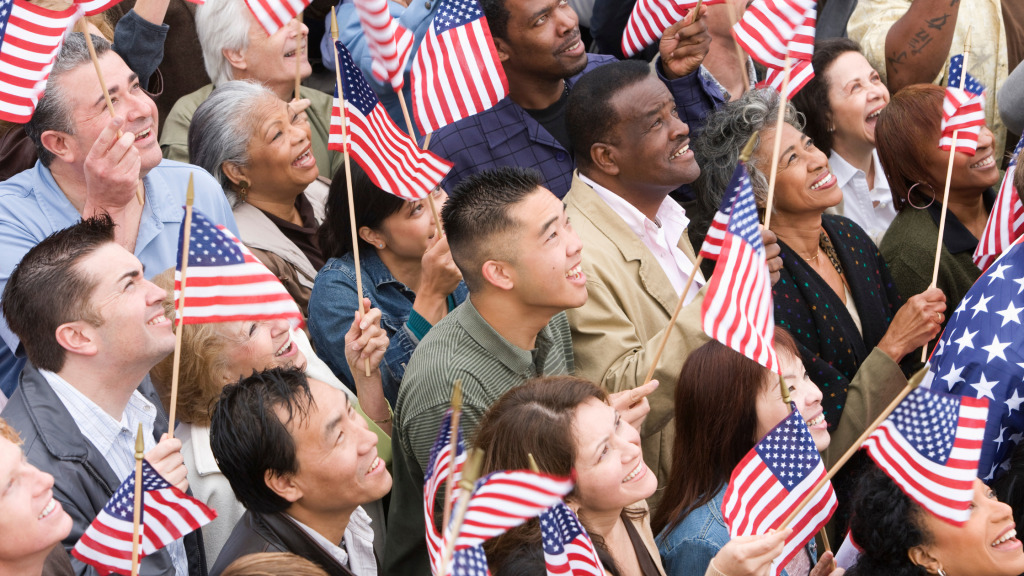
We enjoy witnessing the new sense of excitement and hope in the July 4th celebrations. For new citizens, hanging flags outside their homes, buying 4th of July attire, and attending parades are significant moments. And seeing Independence Day through the eyes of a family that has been reunited, or a refugee who fled persecution is incredibly inspiring. Therefore, we remember July 4th is more than a holiday. It is a day to witness hope and a sense of belonging again in the eyes of people who have persevered.
A Snapshot of the Impact
Through the challenges of the Covid-19 pandemic, the Immigrant Legal Services managed to assist 649 immigrants in becoming naturalized citizens, from 01/2020 to 06/2022. Consequently, these immigrants, including refugees and asylees, became citizens and swore the Oath of Allegiance to the United States. Remarkably, these new American citizens represented 79 countries and a wide range of ages. For instance, 162 were children, the youngest applicant was 5 years old, and our oldest applicant was 83 years old. And, of the total population, 52% were women.
How You Can Help
As with many areas of justice for refugees and other immigrants, the need is often greater than our own capacity. However, we know you are committed to fighting that good fight to become a welcoming community. Therefore, becoming a trained volunteer to serve in Citizenship Clinics or supporting the work of World Relief through joining the Path, is a great next step. In conclusion, we can help remove the barriers that many refugees and immigrants face to finding the unique belonging of being a US Citizen.
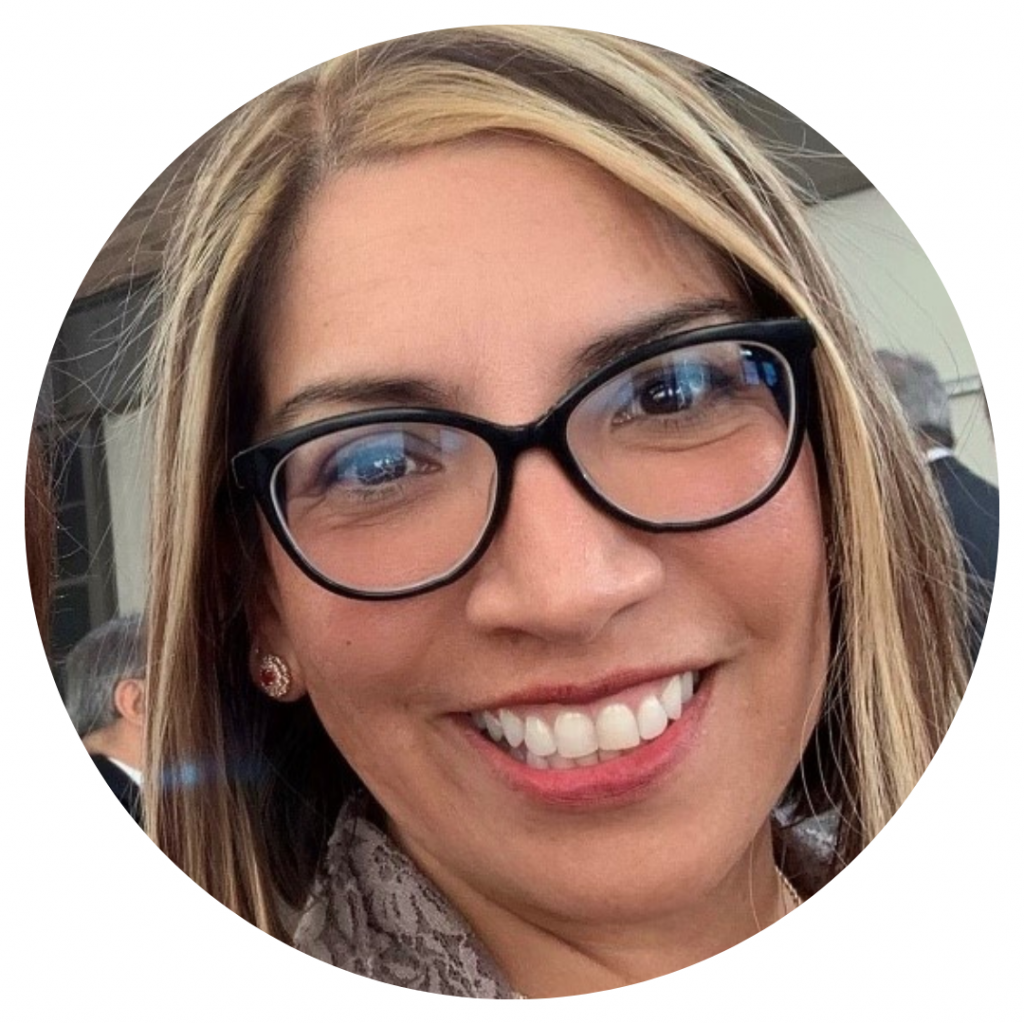
Susan Sosa Bachmeier is the Senior Immigrant Legal Services Specialist for World Relief Chicagoland, Aurora office. She provides direct legal counsel and representation to refugees, asylees, and immigrants seeking administrative benefits, including family reunifications, adjustment of status (green card), and naturalization. Susan is fully accredited to represent clients before the Department of Homeland Security, Department of State, and Department of Justice.
She started her career at World Relief in 2006 as an intern. Additionally, she proudly became a U.S. citizen in 2015. Susan serves her community as a Commissioner for the Human Relations Commission of the City of Aurora. She is an immigrant herself, born and raised in Callao, Peru. Additionally, Susan has a bachelor’s in Sociology from Aurora University and a Certificate in Homeland Security from the College of DuPage.
Read More
María’s Story: Letter from a New U.S. Citizen
Your Family is Coming: A Refugee Family’s Long Road to Reunion
Every day, people leave their homes due to persecution, violence, conflict, and climate-related factors. Their journeys to safety are often marked by loss, separation, and worry for those left behind.
For ten years, Ibrahim was separated from his family. This is their story of enduring hope. It’s a beautiful example of one refugee family reunited after a long time apart.
An Impossible Decision
Ibrahim was born and raised in the Darfur region of western Sudan. He worked a variety of jobs — housekeeping, construction, office administration — in order to provide for his family. There, he lived with his wife, three children, and a baby on the way.
While Ibrahim loved his home and community, conflict left him feeling uneasy. He was concerned for his family’s safety.
Darfur’s ethnic disputes and limited resources have fueled a decades-long conflict. In 2003, a rebel group launched an insurrection in Darfur. The group protested what they considered to be the Sudanese government’s disregard for non-Arab ethnic groups in the region. In response, the government armed ethnically Arab militias to combat rebels in Darfur.
Despite international attempts at peacebuilding and intervention, the conflict worsened. Militias threatened the lives and livelihoods of non-Arab civilians. They burned down thousands of villages, committed sexual violence, and blocked aid organizations from delivering much-needed food and medical supplies.
In 2013, a renewed wave of violence gripped the region. In the face of this conflict, Ibrahim made the heart-wrenching decision to flee Sudan. He left behind his wife and children, in hopes of finding help and a longer-term solution for them all.
“There was too much killing, too much fighting,” Ibrahim told World Relief. “It was impossible to live.”
Seeking Safety
Ibrahim arrived in Jordan hoping to find help. He registered with the U.N. High Commissioner for Refugees (UNHCR), meticulously completing his paperwork.
“I always wrote my kids’ names as my family on all the papers — all the dates of birth and everything,” Ibrahim said. His wife and children, still in Sudan, needed to be included in his case. His hope was that they would be resettled in a new country with him.
Ibrahim found work, sent money home to his family, and waited.
After two years, Ibrahim gained approval for resettlement in the U.S. He passed all required security and health screenings, but his family was still in Sudan. They were unable to travel with him and the family remained separated.
With help from the International Organization for Migration (IOM), Ibrahim flew to the U.S. in 2016, where the World Relief Triad office welcomed him to North Carolina.
Ibrahim remembers feeling like he had escaped death.
“When I arrived, I was so grateful for World Relief because they helped me with everything,” Ibrahim said. “They helped me with a place to stay. They were able to find work for me, and they helped until I felt that I could do things for myself.”
And yet, as Ibrahim rebuilt his life in the U.S., he never stopped thinking of his wife and children, still stuck in Sudan. They frequently spoke over the phone — and Ibrahim continued to hope.
“I couldn’t really rest or enjoy all the blessings I had because I kept on thinking about them all the time,” Ibrahim said. “I never felt complete.”
Hoping and Waiting
Now in the U.S., Ibrahim continued working with IOM in the hopes of bringing his family to North Carolina. He was persistent, calling for updates whenever he could.
With IOM’s help, he was eventually able to secure interviews for his wife at the U.S. embassy in Khartoum, the capital of Sudan. Still, the process crept forward slowly.
Then, in 2019, just when everything finally looked ready to move forward, Ibrahim encountered another obstacle — the president of the United States announced a new executive order banning Sudanese people from traveling to the U.S., Ibrahim’s family included.
The officials said “Everything is correct, all the papers are the way they’re supposed to be. There’s just some rules that they’re not allowing people.”
He began to doubt whether he would ever see his wife and children again. “I almost lost hope,” he said.
But then, in 2021, he got a call. A new U.S. presidential administration had reversed the executive order. Over the phone, he heard the long-hoped-for words: “Your family is coming.”
Ten years after Ibrahim had to leave his family behind in search of safety, after years of hoping and waiting, they would be reunited at last.
Reunited
In February 2022, Ibrahim gathered with staff and volunteers from World Relief Triad at the airport to welcome his wife and four children to North Carolina.
“I broke down in tears because I hadn’t seen them in 10 years, and now they’re here, and it’s real,” Ibrahim said.
“The little one that I left was only three months; when he came, he was 10 years old. I cannot describe how I felt — I was at the point of thinking maybe I will never see them again.”
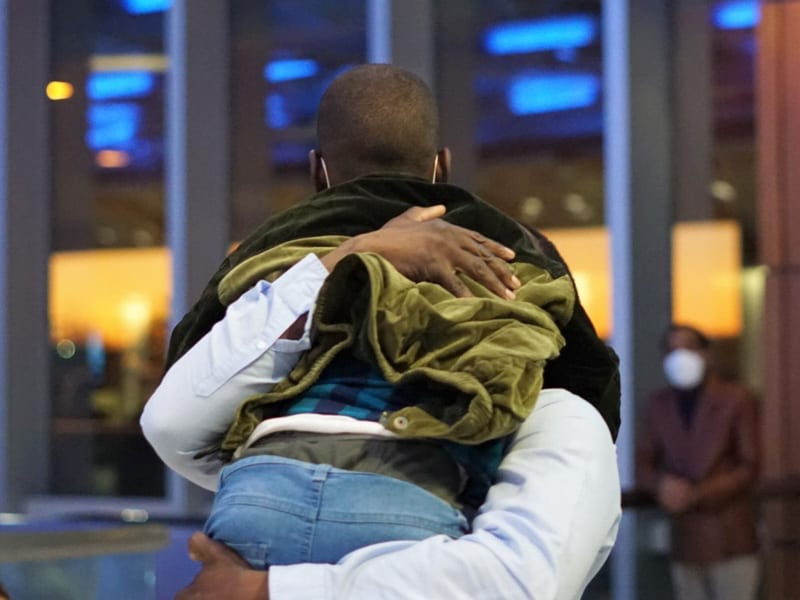
Now, with his family finally together again, Ibrahim has new hopes.
“My hopes are for my kids,” Ibrahim states. “For them to get the right education, for them to be able to be good people. I want them to make something for themselves and make me proud… for them to benefit themselves and our new country — the United States.”
Remembering Those Left Behind
Even as Ibrahim and his family continue building their new life together in the U.S., he often remembers Darfur and the family, friends, and neighbors they had to leave behind.
“People are really suffering there. They don’t have food, they don’t have water, they live in very unsafe, unhealthy conditions,” he said.
The UN estimates 2.5 million people are living in displacement camps across Darfur, and 6.2 million people will need humanitarian assistance in the region within the next year. The same factors — war, violence and persecution — that drove Ibrahim and his family to find safety are still impacting people in Sudan today.
At World Relief, we recognize that addressing the drivers of mass displacement requires a multi-faceted and holistic response. In Sudan, World Relief is on the ground providing humanitarian assistance and investing in development and peacebuilding efforts to address the underlying factors contributing to conflict and displacement.
Together, We Can Respond
Building a just world means coming alongside families like Ibrahim’s once they’ve reached the U.S. and it means finding lasting solutions to the problems that force families to flee in the first place.
For Ibrahim, his hope for safety and brighter futures for those still in Darfur endures — “I really would like for them to… have a better life for themselves and for their kids.”
Together, we are taking action, hoping and praying for lasting solutions for displaced and separated families like Ibrahim’s both in the U.S. and in countries around the world.
World Relief Chicagoland relies on partners and volunteers like you to help build welcoming communities. Join us on the path to hope, transformation, and lasting change alongside refugees and immigrants like Ibrahim.

Kelly Hill serves as a Content Writer at World Relief. She previously served as Volunteer Services Manager at World Relief Triad in North Carolina before moving to Salt Lake City. With a background in International and Intercultural Communication, she is passionate about the power of story to connect people of diverse experiences.
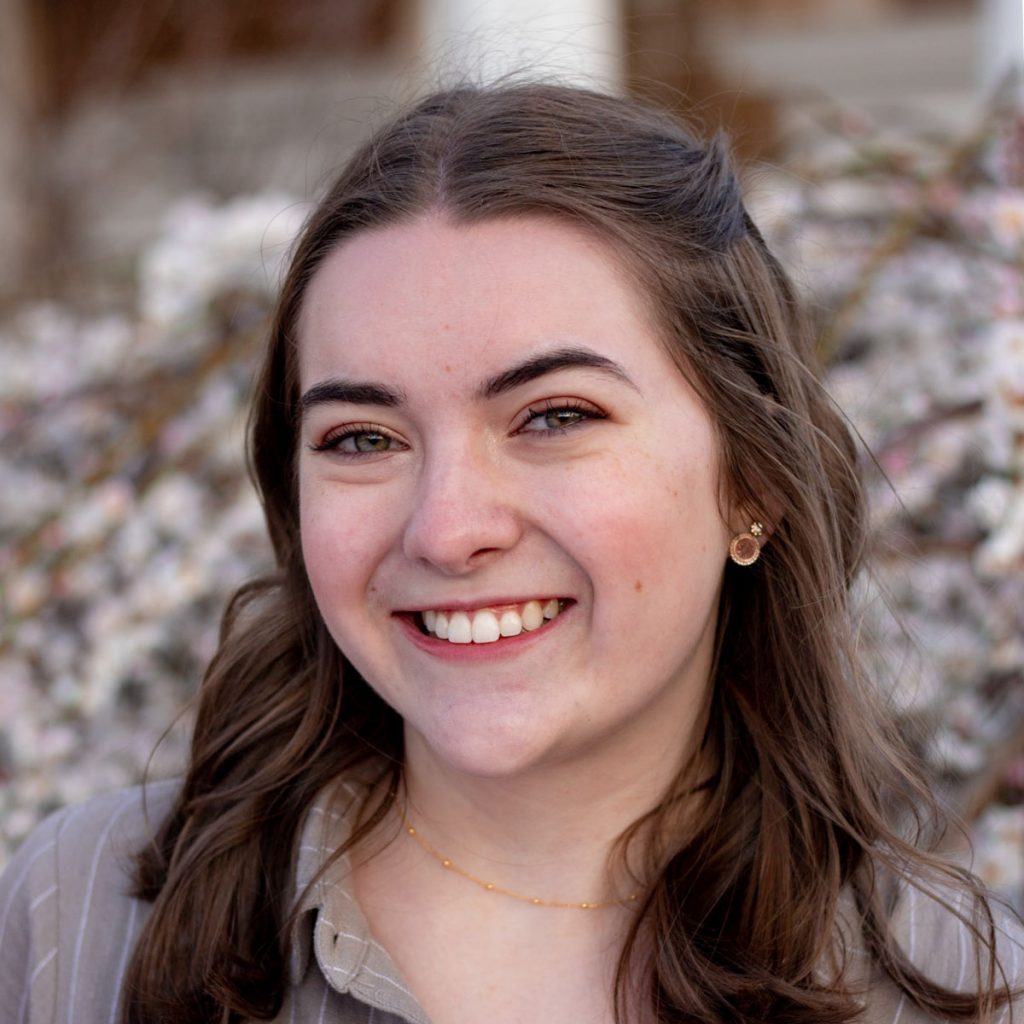
Abby Ray has been serving as the Communications & Advocacy Coordinator at World Relief’s Triad office since September 2021. She works to amplify the voices of clients, staff and community members by empowering them to share their own stories.
A Refugee Family’s Long Resettlement Journey
For refugees seeking to rebuild their lives, their journey to the United States can be long and fraught with challenges. While the average time it takes for a refugee to be vetted and screened to come to the U.S. is about two years, many people leave their homes long before. UNHCR reports that some refugees who flee crises in their home country end up living in refugee camps for years or even decades. However, the vast majority of refugees live in cities, where they may live in limbo for 10 to 26 years, often with limited job and educational opportunities. Nobody wants to become a refugee. And most hope and pray to return to their home country someday.
When that’s not possible, it’s important that countries like the United States welcome refugees and provide a way for them to rebuild their lives permanently. But while their arrival in the U.S. is a cause of celebration, refugees have not yet reached the end of their journey. Coming to the U.S. sets refugees down a new road full of obstacles and barriers they must overcome in order to thrive in their new country.
World Relief’s job is to help the community be a place of welcome for refugees so that they can overcome these challenges and truly celebrate belonging and making a new home. Learn more about how you can walk this path with new arrivals by going on the journey of a refugee family below.
First Day of a Refugee Journey in the U.S.
Behind the Scenes
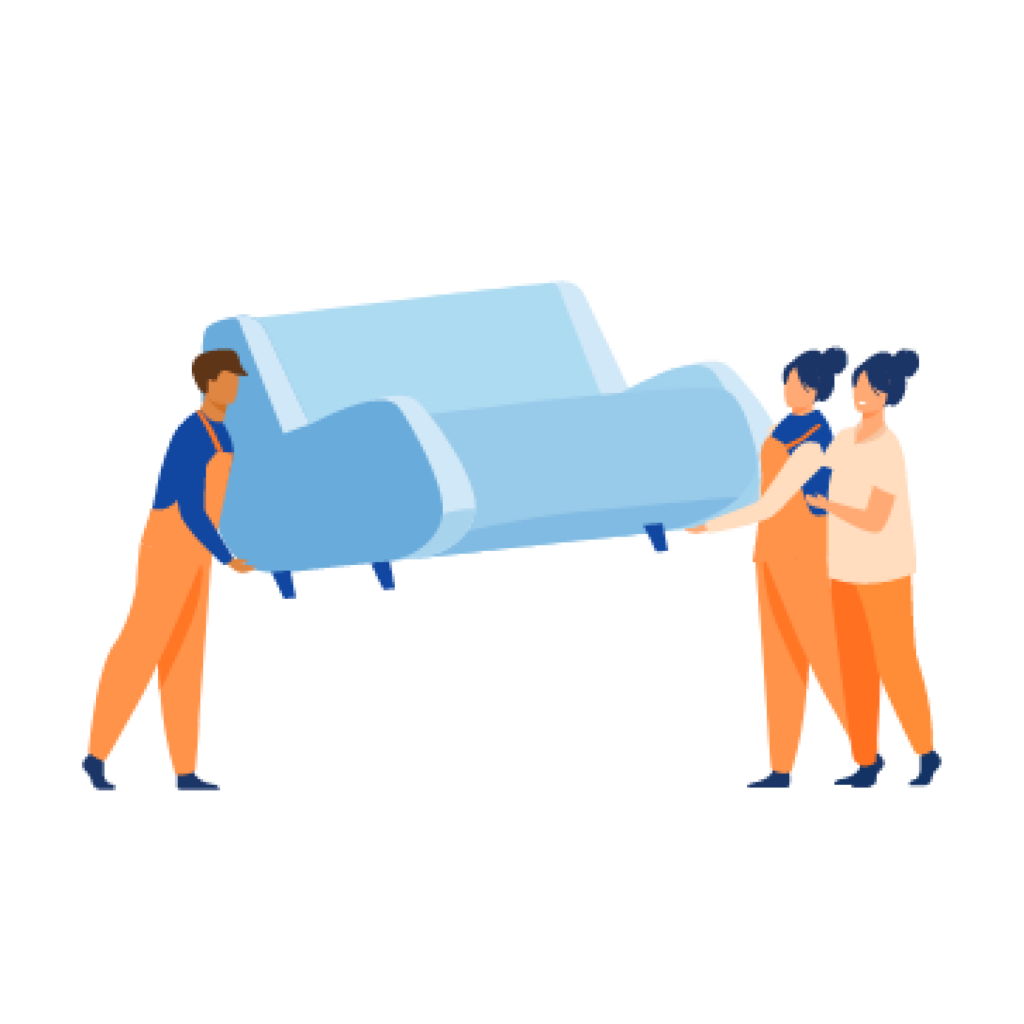
Even before a refugee family arrives, World Relief staff and volunteers from a local church or community group begin preparation for their arrival. Together, they move furniture and essentials into an apartment so that the family has what they need to feel comfortable and at home. By the time a refugee family arrives, they will have a home equipped with beds, a kitchen table, chairs, a couch, other furniture, and kitchen utensils. Volunteers like you also stock the pantry with familiar foods, coffee or tea, and cooking essentials. This helps provide a safe and welcoming place for a family to rest after their travels.
Arrival
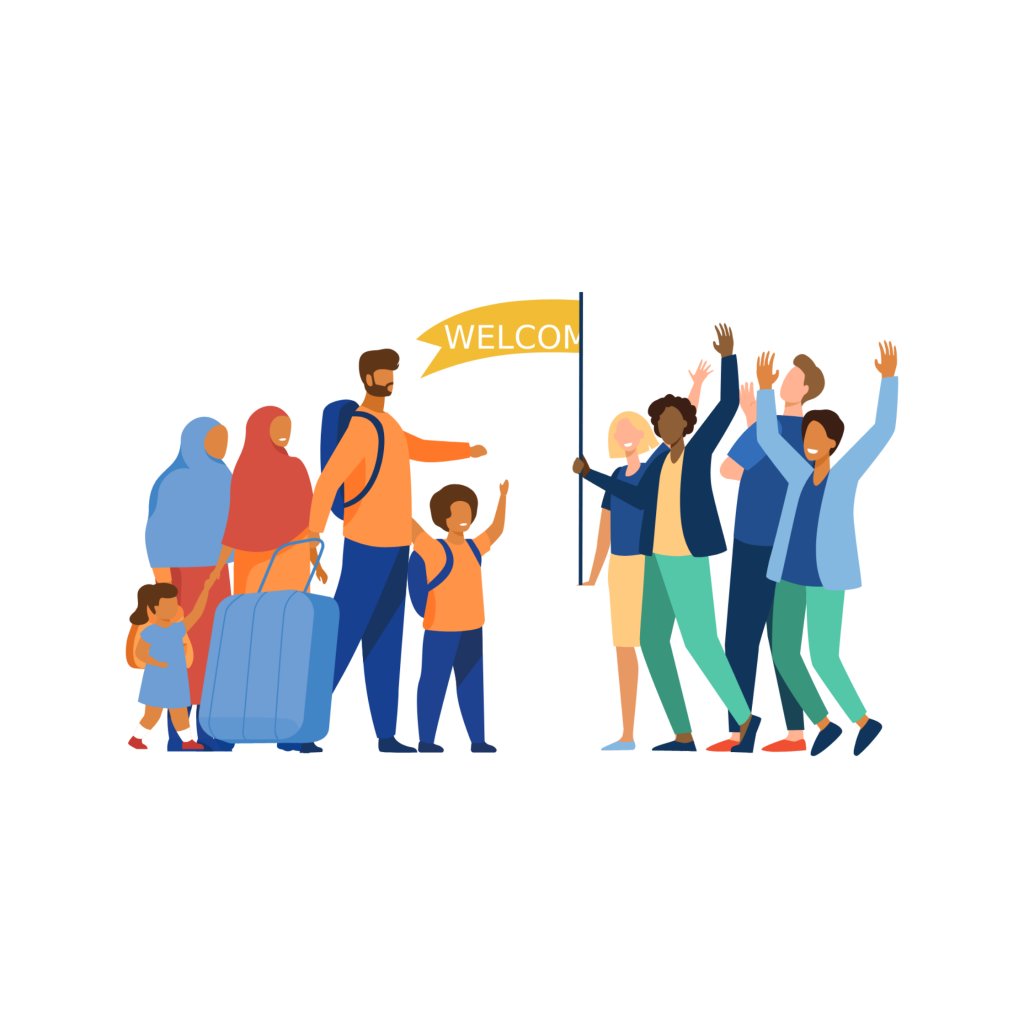
When a family or individual arrives to the United States, they often bring with them hopes and big dreams for the future. They are still mourning the lives and loved ones they left behind, but they also have expectations and goals for life in the U.S. From the time their plane lands at the airport, World Relief staff and people like you are there to welcome them and drive them to their new home.
First Week
Orientation to the U.S.
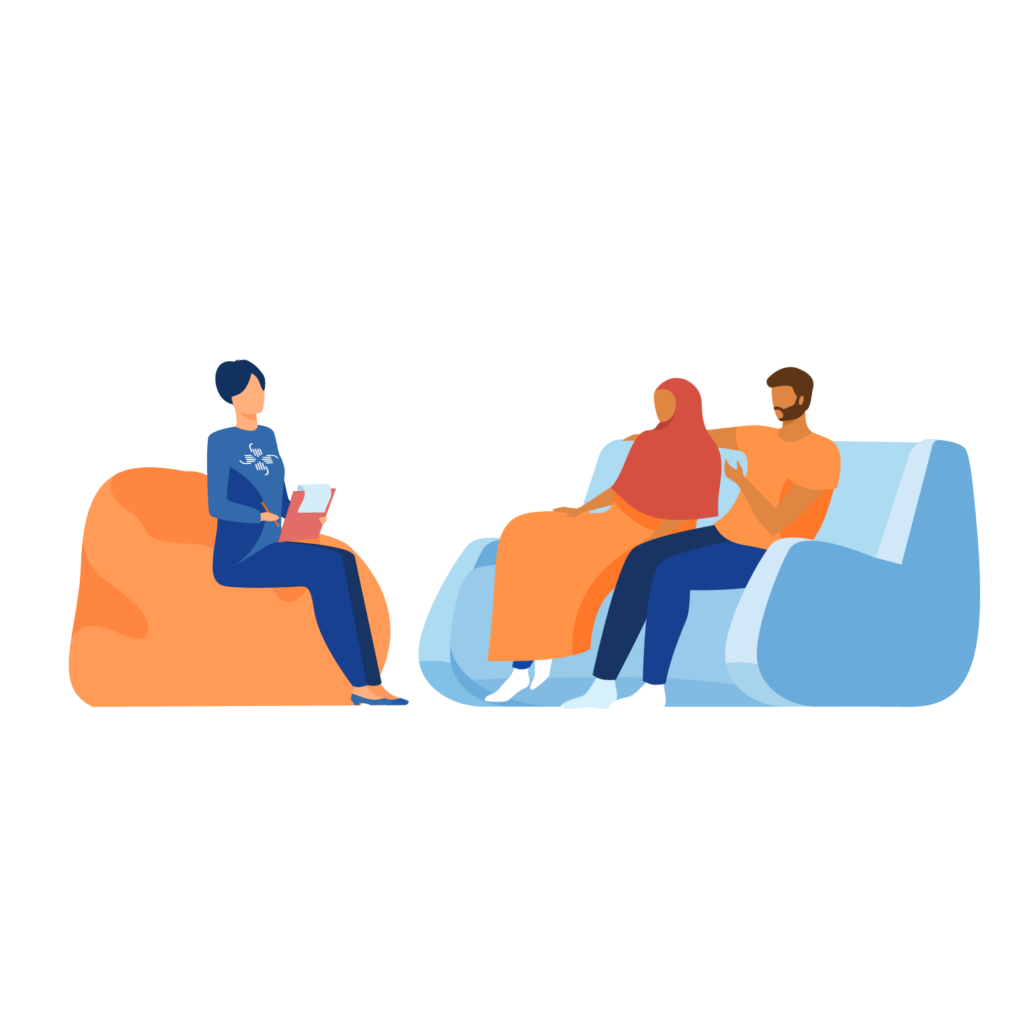
After a few days, the family sits down with World Relief staff and a Good Neighbor Team, a group of committed volunteers from the community who commit to supporting the family for the next six months. Together, they create an action plan to guide the family for the upcoming weeks as they settle in. The family and volunteers share with the family about the community and things they need to know.
First Month
Adjusting to the New Community
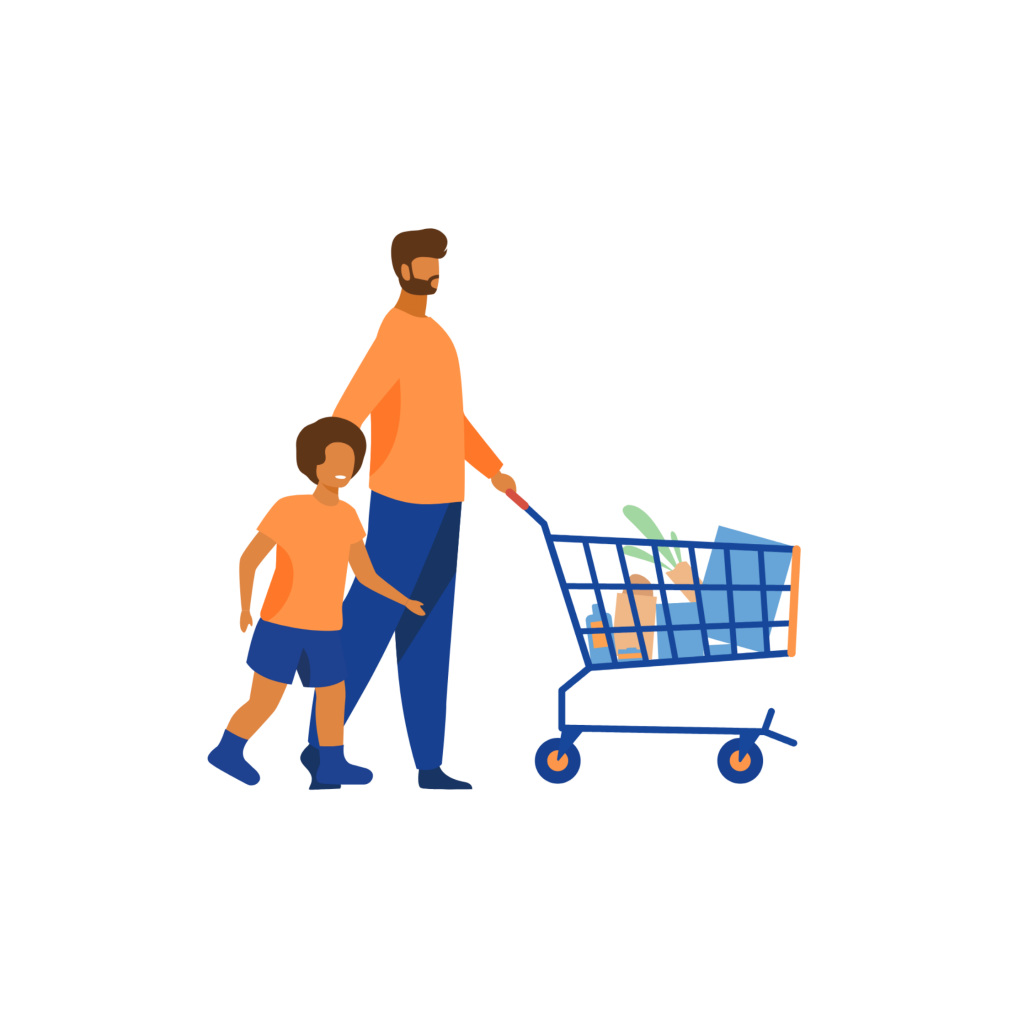
For the next few weeks, the family stays busy. There are errands to run. Doctors appointments to go to. Lots of paperwork. And there are many little tasks to do…everything from applying for social security cards to enrolling children in school.
First Three Months
Support for Children and Youth
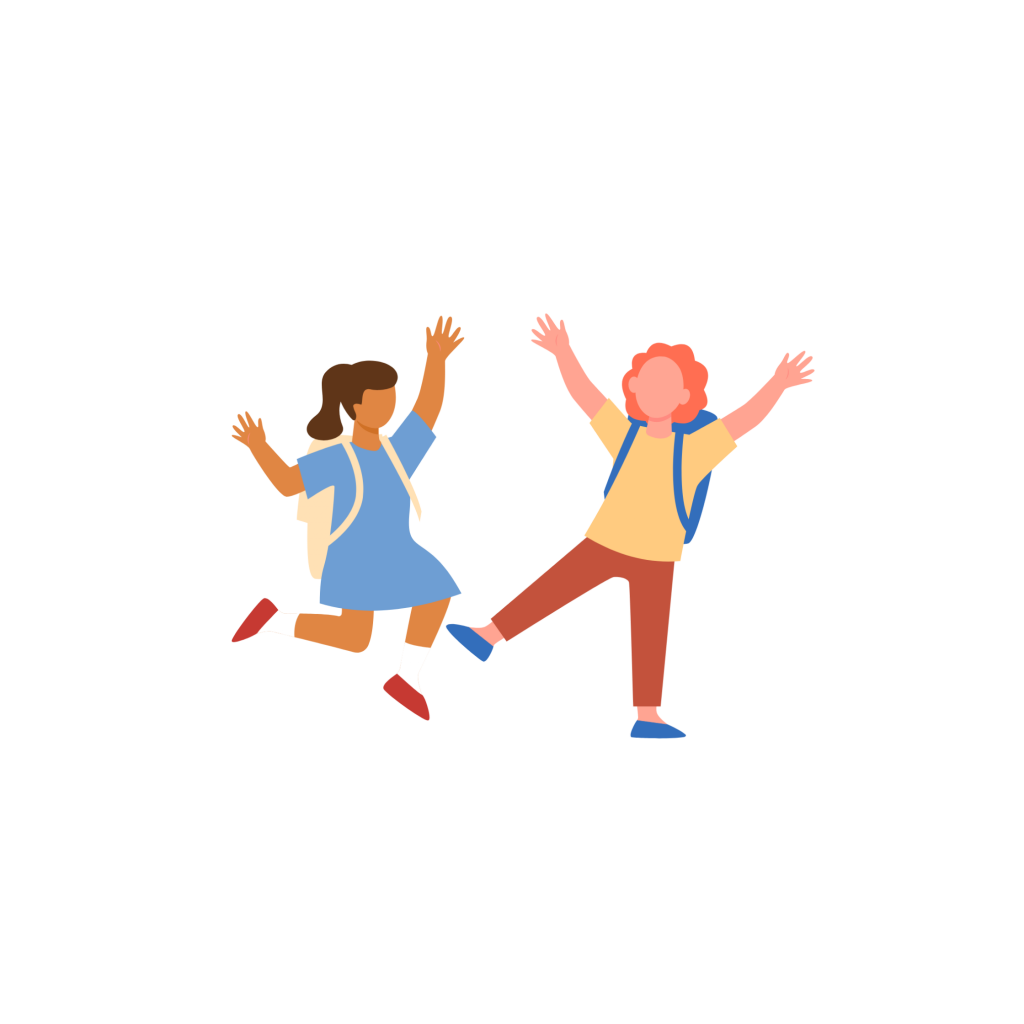
As the family adjusts, the kids get to participate in World Relief’s after-school clubs. There, they get homework help, play games, and meet other children. Social-emotional learning (SEL) activities help the children and youth process their emotions and build self-confidence. They learn and play alongside other children and practice important life skills like relationship-building and conflict resolution. And they get academic support from people like you so they can succeed in school!
Learning English
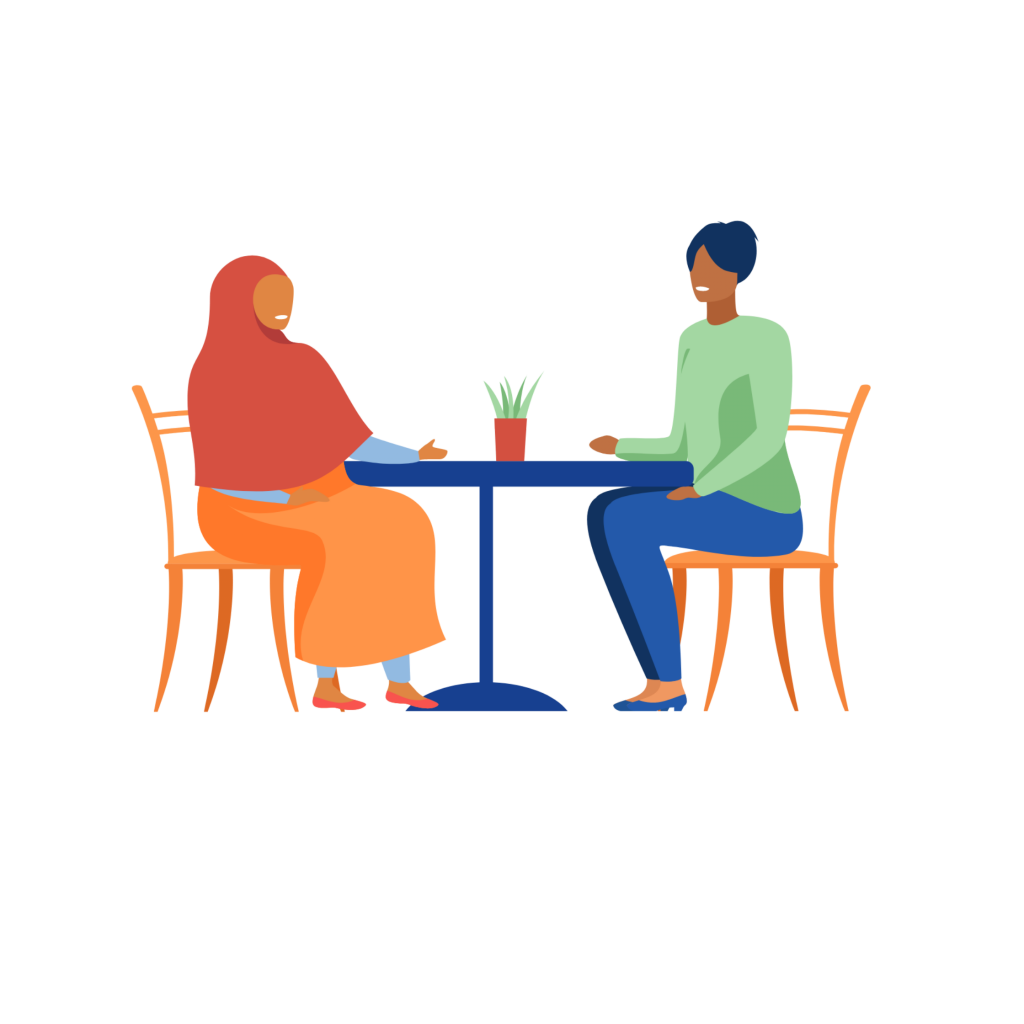
The parents join English classes. There, World Relief teachers, volunteers, and other English learners come together to practice their skills speaking. The family checks out an iPad from the technology lending library, which they use to do English homework and join classes on Zoom. Conversation cafes give language learners the chance to practice their conversational English by talking with community volunteers like you.
Starting New Jobs
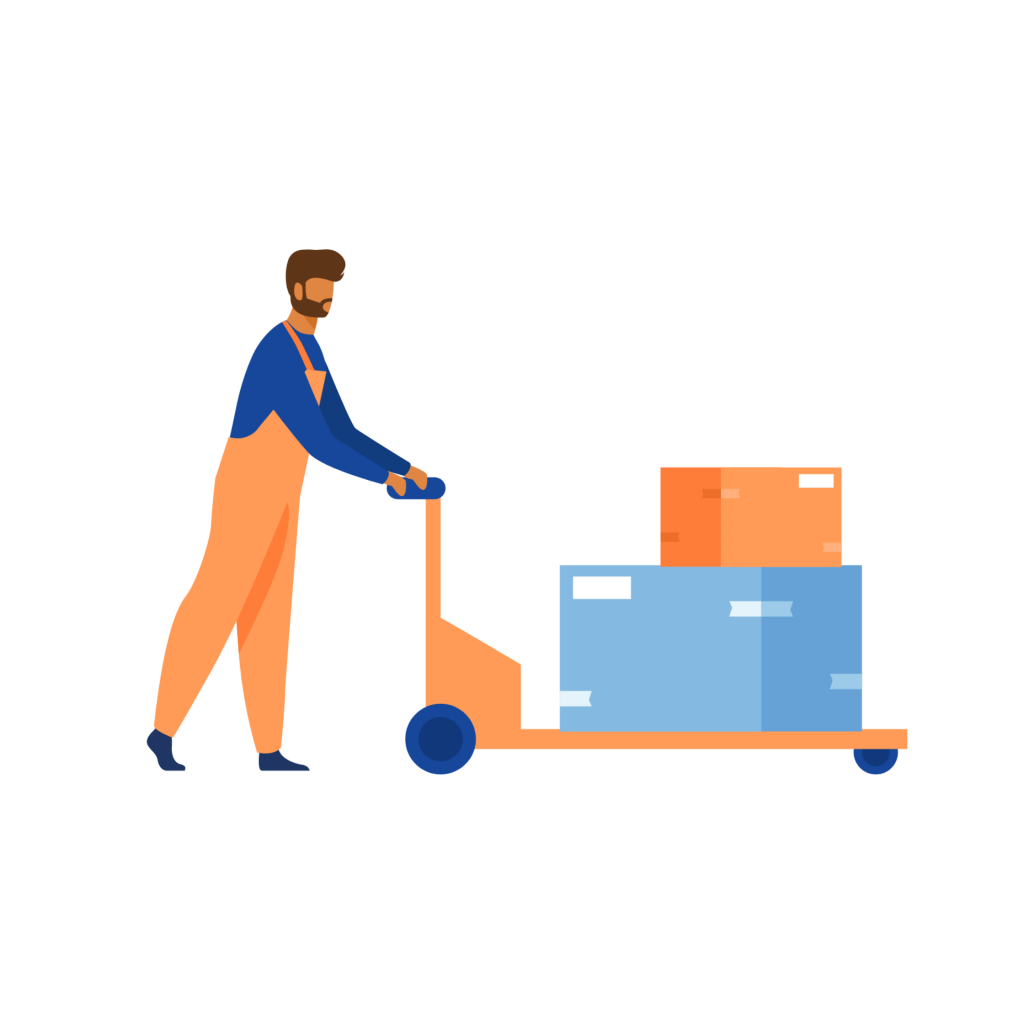
Local business partners help the parents start new jobs, and World Relief’s Employment Services team helps them prepare for their new roles and start work. Later on, the Refugee Career Pathways team will help them brainstorm their long-term career goals and develop job skills.
First Year
Immigration Processes
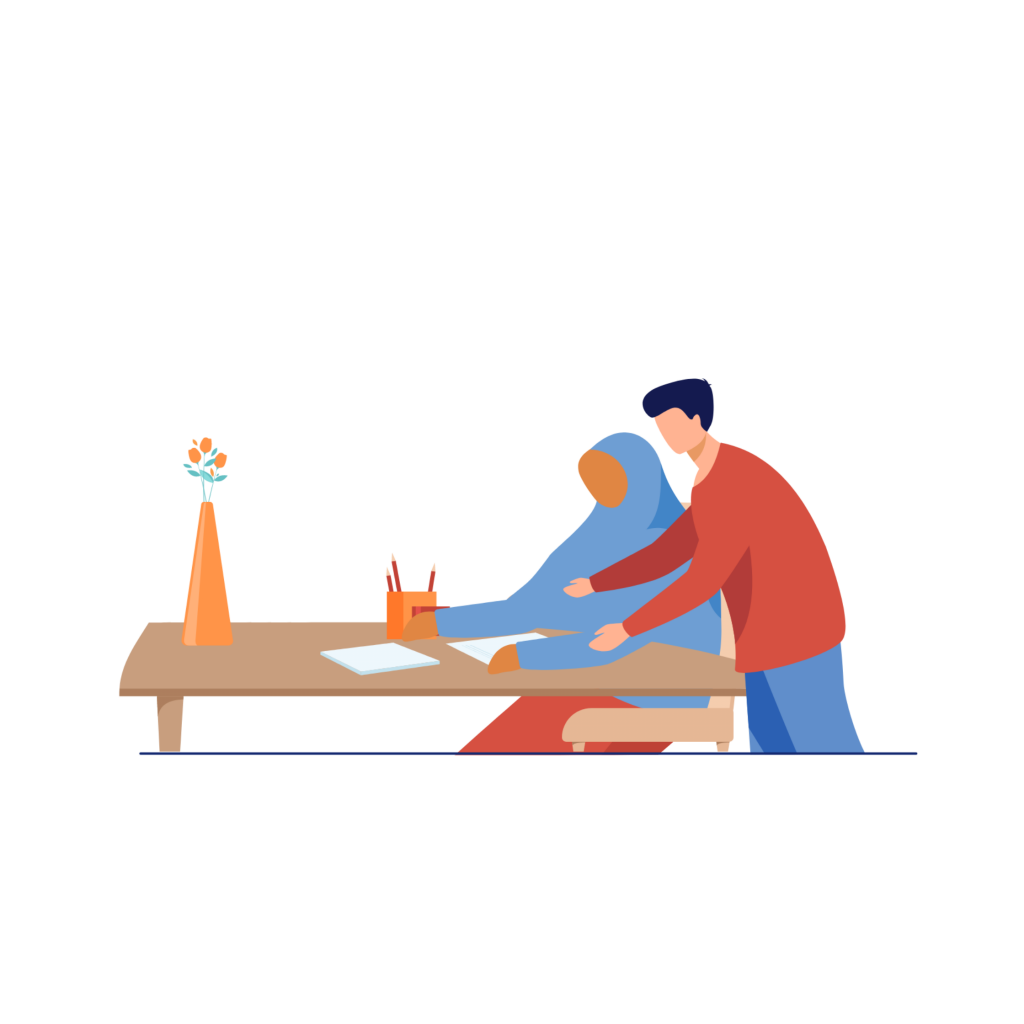
Eventually, the family will apply for Green Cards so they can stay in the U.S. permanently. They gain the help of a World Relief staff attorney who helps them take this important next step – gathering documentation, filing paperwork, and completing all necessary steps. With affordable, qualified legal help and interpretation, the family does not have to worry about their legal pathway to become permanent residents or citizens.
First Five Years
Community Engagement
After a few years, Mom Sarya gets involved in the community. She joins a parent committee at her daughter Jamila’s school. Along with the other parents, she gets to support her daughter’s teachers and help create a welcoming environment for all students.
Saving for Long-Term Goals
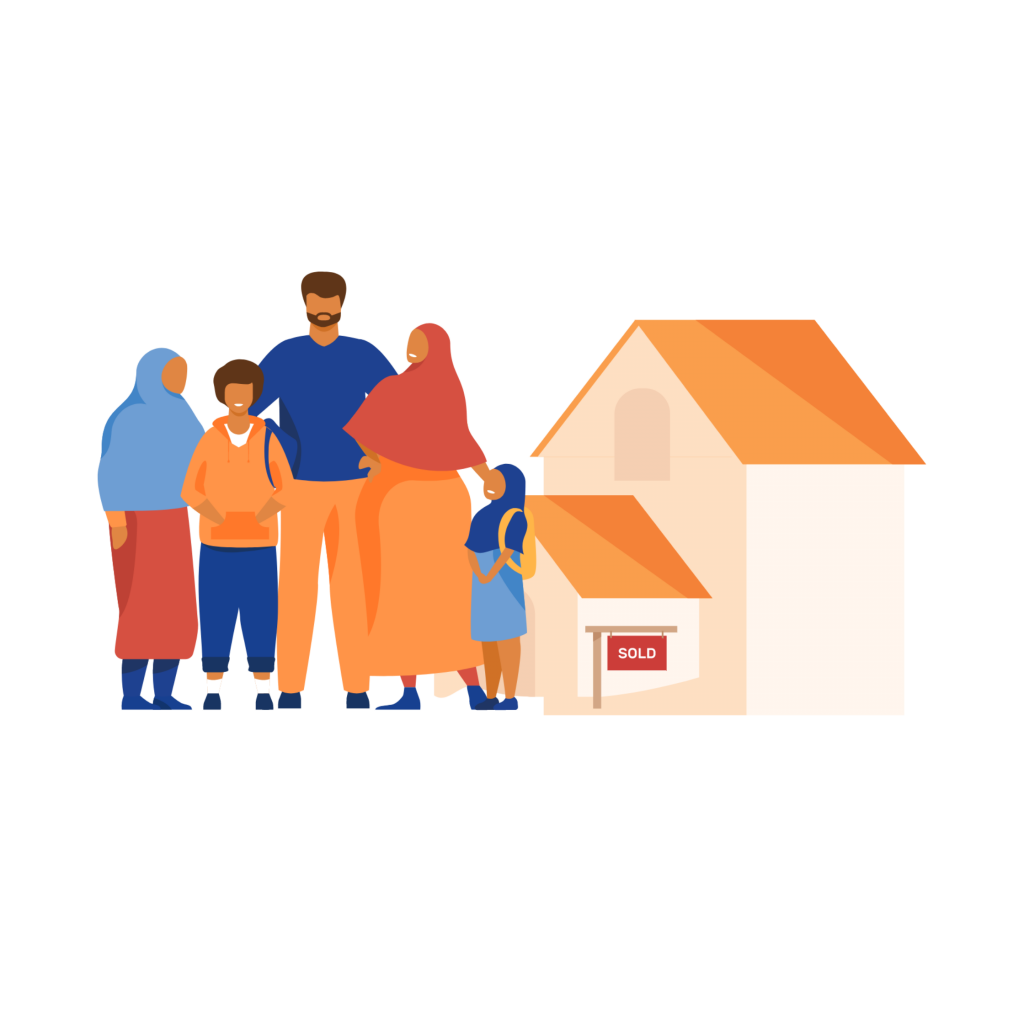
When the Ahmadi family joins the World Relief’s financial literacy program, they start learning how to manage money. They learn about debt, credit, and banking. Eventually, they join a match savings program and start saving money for a home. After a few years of diligent savings, they reach $4,000 and a partner matches their money dollar-for-dollar! They end up with a total of $8,000 – enough for a down payment on a house! Buying a home is a proud accomplishment for the family and a testament to their hard work.
Five Years and Beyond
Reaching Milestones
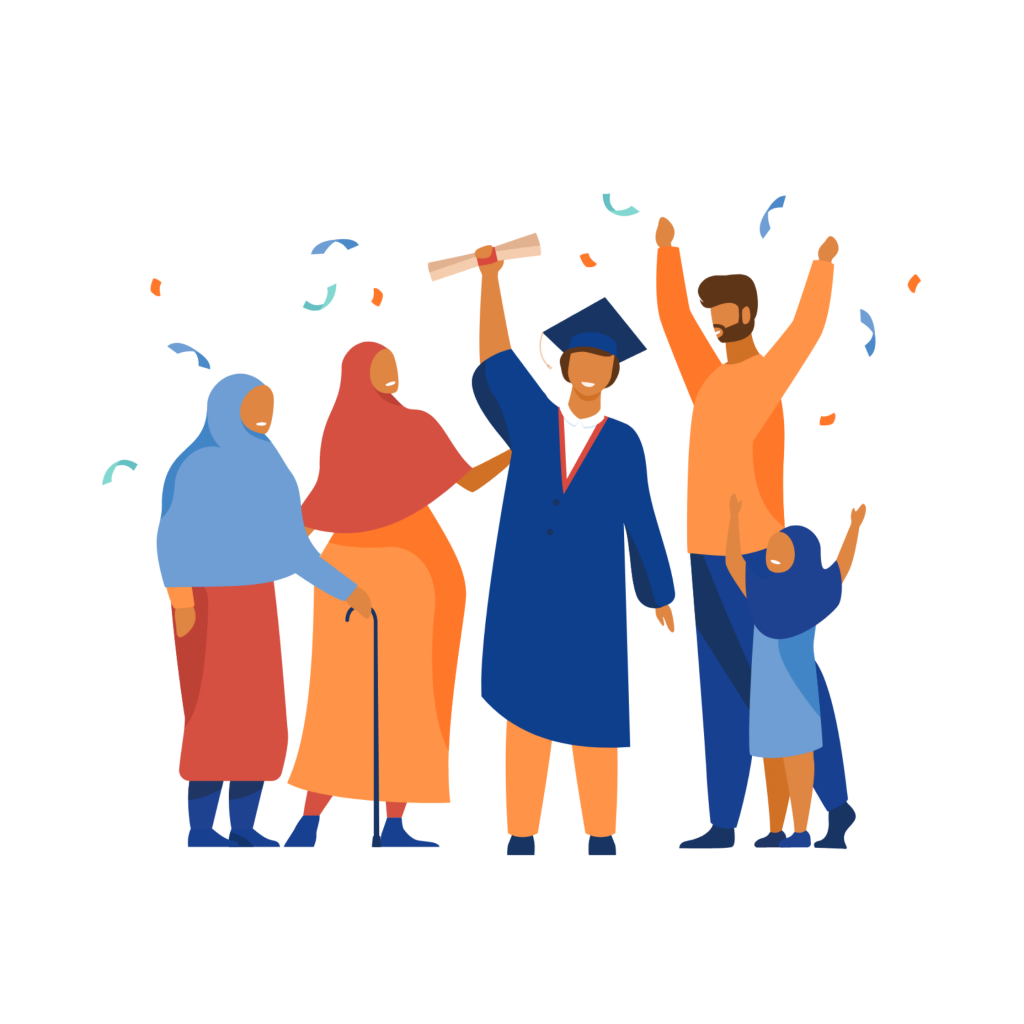
Eventually, the family becomes an integral part of their new community. As they achieve milestones in their careers, education, and personal lives, they celebrate! And we celebrate with them. For years to come, they continue progressing towards long-term goals and building relationships in the community.
Best of all, they move from being welcomed to being “welcomers” and they support other new arrivals on their refugee journey to belonging, just as people like you supported them.
Your Part in Their Journey
It is because of dedicated and compassionate people like you that families like the Ahmadis are able to rebuild their lives in a welcoming community. To find out how you can journey with families today, consider volunteering or becoming a monthly partner by joining the Path.
Read More Refugee Journey Stories
Ali’s Story: A Refugee Pharmacist Using His Career to Give Back to Others
Photo Essay: The Afghan Seamstress Sewing Beautiful Garments in Her New Community
Finally, I’m Home: Raphael’s Story of 8 Years Waiting for Resettlement
Building a Community of Safety and Belonging
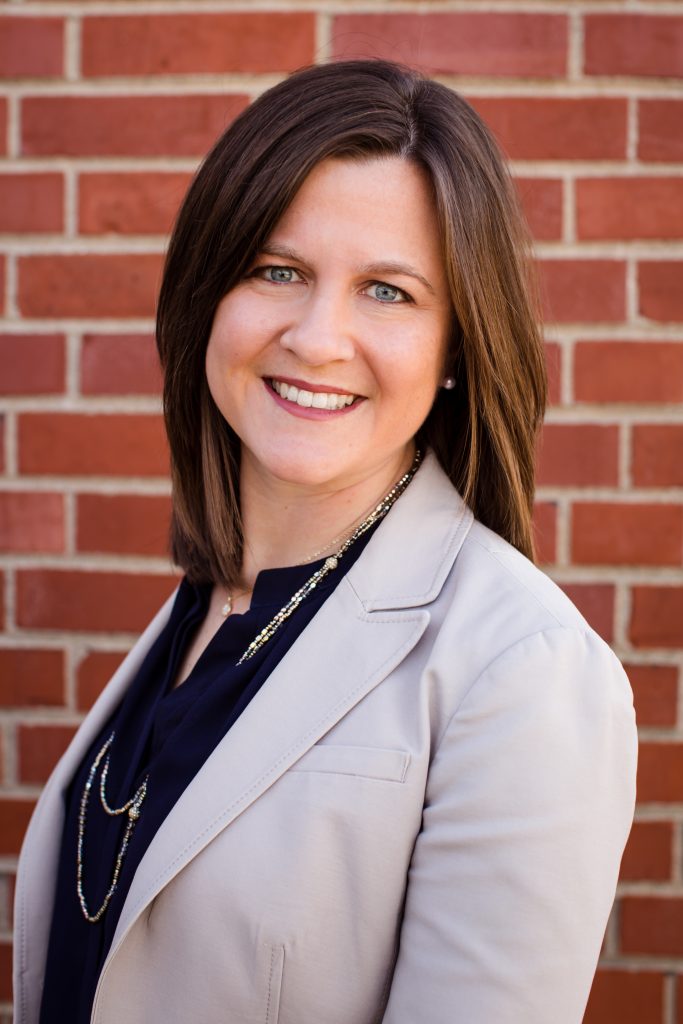
A reflection from World Relief Chicagoland Executive Director Susan Sperry.
June is World Refugee Awareness Month. And on June 20th, we celebrate World Refugee Day. This year, the theme of World Refugee Day is focused on the human right to seek safety.
Whoever they are, people forced to flee should be treated with dignity. Anyone can seek protection, regardless of who they are or what they believe. It is non-negotiable: seeking safety is a human right.
Wherever they come from, people forced to flee should be welcomed. Refugees come from all over the globe. To get out of harm’s way, they might take a plane, a boat, or travel on foot. What remains universal is the right to seek safety.
Whenever people are forced to flee, they have a right to be protected. Whatever the threat – war, violence, persecution – everyone deserves protection. Everyone has a right to be safe.
UNHCR
Who are the people seeking safety?
This is a time of visible conflicts. You might think of Ukraine. There are millions of others who have fled their homes due to less-publicized conflict in places like Ethiopia, Myanmar, or South Sudan. Many of these people become refugees. And during Refugee Awareness Month, it is important that we tell their stories of leaving home to seek refuge.
And yet there are others too – people who arrive in the United States seeking protection from violence because of their identity, religion, or views.
June is National Immigrant Heritage Month, so we also have the time to consider our immigrant neighbors who left beloved homelands, friends, and family…to seek safety and a place to live freely.
This month, I am reflecting on the key reason why both refugees and immigrants must have the right to seek safety: each one is a human being. Those of us who follow Jesus believe in the concept of the “Imago Dei”: that each person is made in the “Image of God.” Let’s explore a few reasons why that makes such an impact on how we treat our immigrant and refugee neighbors.
1. Remembering the Imago Dei Transforms Our Relationships from 2D to 3D
I recently had a conversation with a pastor about what it means to cultivate deep relationships. This pastor framed the conversation as taking a relationship from two dimensions (2D) to three dimensions (3D). By necessity, all of us have “2D” relationships. There are people we know of and we know about, but we don’t know in-depth. We know their outer image, but it’s more of a caricature. We may not think of them as a complex individual with the same level of joy, pain, and experience that we have.
A person becomes “3D” when we spend time together. By talking, laughing, eating, and being human together, we gain insight into their joys, pains, dreams, and fears. When we share life together, we become better able to see the image of God in the person before us and also recognize it within ourselves.
That’s also how we begin to understand each other’s potential. We recognize their capacity to love, create, and build relationships — and that those are qualities we share by virtue of being humans, created in the image of God.
Relationships that move from 2D to 3D begin the process of building community. And in community, where we recognize each other’s humanity, potential, and limitations, we can create safety and space for each other to thrive.
2. Developing Relationships and Belonging Requires Time
In more than 20 years with World Relief, I have seen thousands of people resettled and thousands more immigrants become a part of the World Relief community in Chicagoland. And I have experienced the many ways that being together in community is rewarding and transformative for all involved. In my friendships with immigrants and refugees like Deborah, Jerome, Mohammad, Durmomo, and many others, I have gained an appreciation for the way that the image of God manifests in the creativity, wisdom, and compassion of those around me. Keep an eye out for an upcoming blog series from my friend Durmomo about this!
In each of these friendships, investing time with each other has transformed a 2D image in my head into a 3D understanding in my heart. I am deeply grateful for how these relationships and how we continue to shape each other.
3. Our Value as Humans Gives us the Right to Seek Safety
Christianity, and many other faiths, emphasize the fact that human life is precious. This common thread across cultures is backed up in the theological belief of Christians, that humans created by God and loved by Him, are valuable and important. When someone’s life is threatened, they should have the right to seek safety so that they can experience peace, a relationship with God and others, and the opportunity to use their God-given talents and passions. As Christians, we can protect that opportunity by creating a welcoming space.
I believe that together, we can form a movement to serve the vulnerable people among us. That includes extending safety to refugees and immigrants who have fled war, violence, and persecution and allows us to see the value in every human life. We welcome them. Whoever they are, wherever they come from, and whenever they arrive.
Continue reading:
Ali’s Story: A Refugee Pharmacist Using His Career to Give Back to Others
Finally, I’m Home: Raphael’s Story of 8 Years Waiting for Resettlement
20 Ways to Learn More About Refugees
Around the world, 103 million people have been forcibly displaced from their homes — the highest number in recorded history. Of those, 32.5 million are considered refugees, having fled across an international border due to war, violence, conflict or persecution.
That’s millions of mothers and fathers, daughters and sons, teachers, doctors and friends — each created in the image of God — with full lives and identities long before they became refugees.
As we enter World Refugee Awareness Month and look toward World Refugee Day on June 20th, we’ve compiled a list of books, podcasts, videos and more to help answer your questions about refugees. As you engage with and share these resources, we hope you’ll be inspired to join us in creating a world where everyone can thrive.
READ
Some advocates have described Jesus as a refugee. But was he really? World Relief CEO Myal Greene tackles that question and how the answer should shape the Christian response to refugees and other vulnerable immigrants.
Blog: Drivers of Mass Displacement
People are displaced from their homes for myriad reasons, including persecution, conflict, violence, human rights violations and climate-related factors. World Relief’s Lydia Dawson explains the drivers of mass displacement and how World Relief is responding globally.
Blog: Worth the Wait: A Story of Faith, Perseverance and Love, Despite the Odds
For seven years, Congolese refugees (and newlyweds!) Mbimbi and Goreth didn’t know if they would ever see each other again. Read their story to learn more about the challenges and uncertainties that many refugees face as they rebuild.
Book: Inalienable: How Marginalized Kingdom Voices Can Help Save the American Church
U.S. churches are at a critical crossroads — blurred lines between discipleship and partisanship have compromised our witness and confused our national and individual responses to refugees and “the stranger.” In their book, pastor Eric Costanzo, missiologist Daniel Yang and World Relief’s Matthew Soerens find hope in the witness of global Christians, the poor and the ancient church.
Book: Beyond Welcome: Centering Immigrants in Our Christian Response to Immigration
Karen González invites Christians passionate about serving immigrants to explore how we can create welcoming communities that put our immigrant neighbors at the center of the conversation.
Book: Everything Sad is Untrue: (a true story)
Following his mother’s vocal embrace of Christianity, Daniel Nayeri, his mother and his sister were forced to flee Iran. In this memoir, he retells the tales of his family’s history from his perspective as a misfit middle schooler in Oklahoma.
Book: The Girl Who Smiled Beads
When Clementine was six years old, she and her 15-year-old sister, Clair, fled the massacre that was happening in their home country of Rwanda. In this riveting memoir, Clementine tells their story of rebuilding and reclaiming life on their own terms.
LISTEN
This World Relief mini-series offers a global and a biblical perspective on the subjects of immigration, mass displacement and refugee resettlement, diving into current policies and practices and sharing stories of our collective human experience.
This six-part series traces the U.S. refugee resettlement journey through the eyes of those directly experiencing it. Follow along as each episode brings the listener into the daily lives of refugees adjusting to life in the U.S.
Podcast Episode: Holly Andrews on How the Church Can Walk Alongside Refugees
In episode 4 of our Forward Together podcast series, Holly Andrews explains how churches can use the resources they already have to help refugees and other immigrants rebuild their lives.
WATCH
TEDx Talk: One Refugee’s Life Experience | Come Nzibarega
Born and raised in Burundi, Come Nzibarega shares his story of escaping torture and civil war and why he thinks refugee camps are the richest places in the world.
For Ibrahim’s family, the road to resettlement, reunion and rebuilding has been long. Learn more about the obstacles families like his can face as they seek safety.
Video: Who are Refugees and How Do They Arrive in the United States?
From flight and displacement to arrival and integration, this 7-minute animated video tells the true story of a refugee family’s experience in each stage of the refugee resettlement process.
STUDY
World Relief Workshop Course: Intro to Resettlement
Have you ever wondered what actually happens in the resettlement process or what a resettlement agency does? This FREE, 45-minute course will answer those questions and explain how you and your community can support refugees resettling in the U.S.
World Relief Workshop Course: Navigating Friendships
Navigating friendships with those who are different from us can be rewarding — and challenging! In this self-paced, online course you’ll learn essential skills for building empowering, long-lasting friendships with those who may differ from you in culture, socioeconomic status and religion, and best practices for supporting a friend who lives with trauma. During the month of June, enroll for 50% off with code WORLDREFUGEEDAY50.
Bible Study: Christ Like Welcome
Jesus astonished the culture around him by giving voice to the speechless, frustrating the powerful and humbling the wise. In this 5-week study from our partners at Women of Welcome, learn how your welcome can become like his — wonderfully surprising, deeply challenging and firmly rooted in love.
Bible Reading Plan: The I Was a Stranger Challenge
Take the challenge and discover God’s heart for those who have been displaced. Over the course of 40 days, read one Bible passage a day that speaks to God’s love for foreigners and refugees.
FOR THE WHOLE FAMILY
Children’s Book: Marisol’s Dress
In the midst of a revolution, young Marisol is forced to flee the life she knows and loves in vibrant Cuba. In this beautifully illustrated book, Emily Ozier follows her mother and grandmother as they journey to the U.S., facing challenges and celebrating along the way.
Children’s Book: My Two Blankets
When Cartwheel moves to a new country as a refugee, everything is strange: the animals, the plants, even the wind. An old blanket comforts her when she’s sad, and a new blanket just might change her world. A story about leaving home, arriving in a foreign land and finding a new friend.
For parents and teachers wondering how to talk about mass displacement with children and teens, the UN Refugee Agency offers teaching materials on refugees, asylum and migration, as well as guidance for teachers working with refugee children in the classroom.
Want to keep learning? Stay informed about refugee resettlement and World Relief’s work to care for those in vulnerable situations around the world by signing up for our monthly email newsletter.

Karen Spencer is World Relief’s U.S. Marketing Partner and serves U.S. offices including World Relief Chicagoland in the area of identity and messaging. She previously served as Mobilization Director for World Relief in Memphis, where she lives. She is a connector of people, places, passions and purpose.

Kelly Hill serves as a Content Writer at World Relief’s home office. She previously served as Volunteer Services Manager at World Relief Triad in North Carolina before moving to Salt Lake City. With a background in International and Intercultural Communication, she is passionate about the power of story to connect people of diverse experiences.
Ali’s Story: A Refugee Pharmacist Using His Career to Give Back to Others
In 2010, a man named Ali AlQaisi arrived to the U.S. as a refugee from Iraq. At home in Baghdad, he had worked as a pharmacist. But when he and his family arrived to the United States, he faced the challenge of starting over entirely. He had to rebuild his life. He had to restart his career.
But the journey to gaining his credentials and returning to the health sector would not be an easy one.
The challenges could be easy to overlook In 2022, Ali is a clinical specialist with CVS Health and is board certified in geriatric pharmacy. By any standard, his is a story of massive success. He even won a 2021 Paragon Award, a recognition from Omicron of CVS Health that is “granted to an exceptional employee who best embodies the company’s values, is a model of excellence, and lives its purpose every day.”
But Ali is not just excelling in his career. Part of his mission is to help others in his community…so that all can succeed! One way he does that is by tutoring immigrant medical professionals preparing for pharmacy exams. Each person must pass the exam to practice in the United States, but this can be challenging to manage in a new language while working to support a family and navigating a new cultural environment. Ali walks with other immigrants as they study, and he helps connect them with internship and job opportunities so that they can grow in their careers.
“I know what an overwhelming experience it is to start over in a new country. If I can help ease the transition of one refugee, it is worth it.”
Ali AlQaisi, a refugee from Iraq
Hear Ali share more of his story below.
Fleeing Violence in Search of Hope
My family and I left our hometown in 2006 due to sectarian violence. This violence hits very close because I lost my dad to it. We left the country and went to Lebanon where we registered as a refugee with the United Nations. We waited there for four years and in 2010, we came to the United States.
I arrived here with my wife, my seven-month-old son, my mom, and my younger brother.
I can recall that day as the happiest day in our lives. It was also a day full of uncertainty and fear. As like with many other refugees, our main struggle was the language barrier, cultural gap, and adapting to the new system in the United States. When I say the new system, I mean every single detail in our daily life is a struggle for the immigrant and the new arrival.
When I came here, I was 30 years old, and I did not know how to get groceries or baby formula for my son.
I felt incapable of taking care of myself and my family. I look back and have no idea how we could have made it without the help and support we received from World Relief. World Relief was there from the first day as they waited for us at the airport. They provided us with everything we needed to settle down and they guided us step by step.
They provided ESL classes, helped us find jobs, they connected us with a community of well-established families and volunteers, and helped us adapt to the system.
A Career Pathway Back to Pharmacy
Our first year here, I worked in a factory. I was so happy and grateful to provide for my family while I was navigating a very complicated healthcare system in order to transfer my license as a pharmacist. Back then I did not know any foreign pharmacists who had gone through the same process, and this made it very challenging. I did not know how to start. I did not know when to start.
In June 2011, we had our second baby. At that time, I was preparing to take my first exam and I was so terrified and scared to fail that exam because the exam cost $800. I could not afford to lose $800 if I failed the exam, but my wife encouraged and supported me to take it. I took the exam and passed it. We were so determined to succeed. We did all that we could.
The first couple of years in the United States, we did not have a social life. We would work, study, and prepare to take exams. I worked seven days a week and studied for the exam. My wife took care of the kids and worked a part-time job while she was preparing to take exams.
In the beginning of 2014, I became a registered pharmacist in the state of Illinois. Today, I am a licensed pharmacist in 11 states and a board-certified specialist in geriatric pharmacy. My wife is a hospital pharmacy manager. We are blessed with three kids.
Giving Back as a Pharmacist
Since the first day our struggle ended, we made a commitment to support new arrivals and refugees on their journey.
My story is a great example of when you are helping an individual, you are not just helping one person, but you are helping the community. It has an exponential impact.
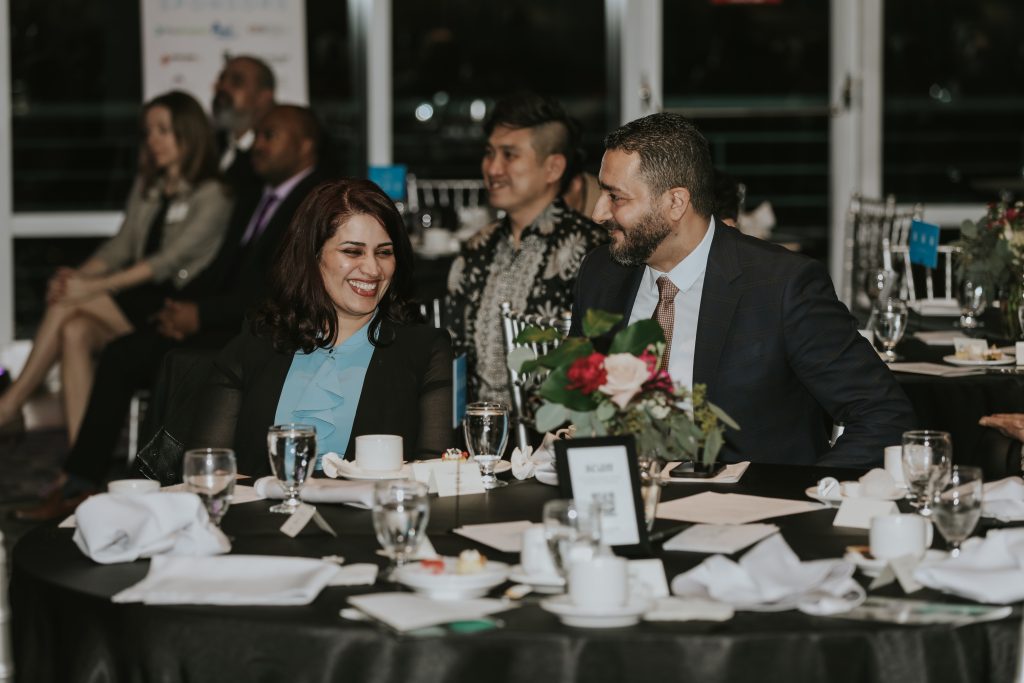
Leading From Where You Are
Ali demonstrates what it means to lead from where you are. He is actively engaged in the Chicagoland community using his professional expertise to help newly arriving refugees navigate the American health system, ensure they attend medical appointments, and reduce language and cultural barriers to support adherence to their treatment plan. And by supporting others in their careers, he is helping build a stronger community.
He is creating lasting change.
Continue reading:
5 Ways You Can Lead in Your Community
Partner Spotlight: Greg & Olivia Evans on “Who is my neighbor?”
5 Ways You Can Lead in Your Community
Creating communities of love and welcome requires all of us. We believe that we each have a part to play and as Susan Sperry reflects in last week’s blog, we all can lead from where we are. For many of us, leading from where we are can feel intimidating and sometimes, we get stuck. If you’re like me, seeing a few examples can inspire you to take the next step. Here are 5 simple ways that you can lead in your community.
Advocate for Refugees and Other Immigrants
From where you are, you can lead through advocacy efforts with World Relief. From pushing for pathways to citizenship for Afghans and Ukrainians to resourcing resettlement efforts as a whole, your voice can create change. In addition to signing on, you can share these efforts with friends, family, or on your social media accounts.
Gather People to Gather Items
Inviting a group of people you know to collect items that help support a newly arrived family is a simple and effective way to lead from where you are. Maybe this is a small group from church, a team from work, or families in your neighborhood. You can find lists of needed items on our website and gather people and items at the same time!
Lead a Volunteer Team
Bringing people together to form a Good Neighbor Team or a HOME team is another way to lead. Take a few minutes to look at the circles you are in. Do you know other people interested in supporting a newly arrived family? Send them a text or make a phone call to see if they want to journey with you to extend welcome. Learn more about serving as a team on our volunteer page.
Lead a Book Club
Recommend a book to your book club around refugee and immigrant issues. Not in a book club? Consider starting one! Here are a few recommendations AND a brand-new book that is being released this month
- Welcoming the Stranger by Matthew Soerens & Jenny Yang
- Seeking Refuge by Stephen Bauman, Matthew Soerens, & Dr. Issam Smeir
- Inalienable by Eric Costanzo, Daniel Yang, & Matthew Soerens
If you are in Chicagoland, join us in person for the official book launch event with the authors on May 31st at 7:00pm.
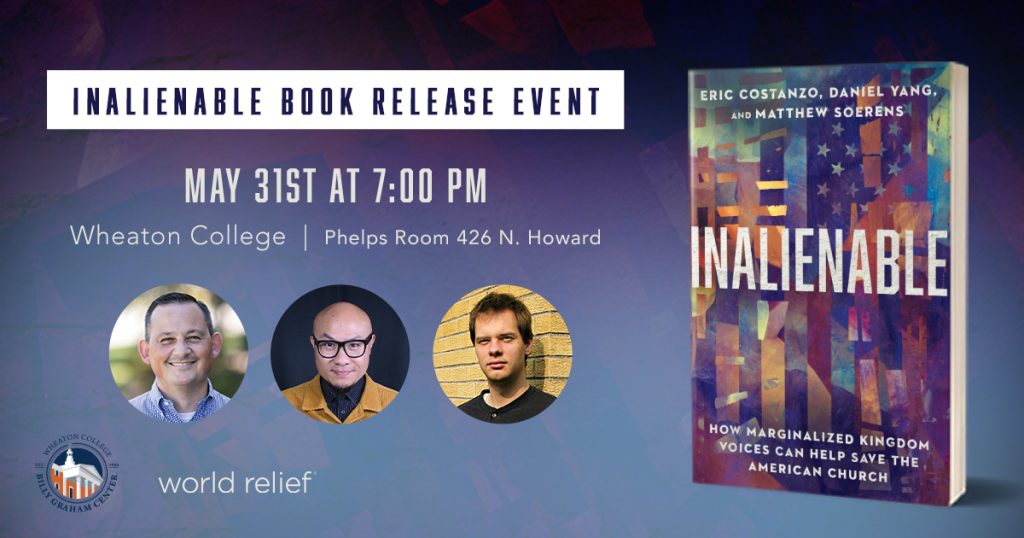
Start a Facebook Fundraiser
Facebook fundraisers are quick and easy to set up. They are a simple way to share with others that you care about supporting immigrants and refugees. And you can invite others to join you in providing the services offered through World Relief. Follow the steps at the link above and select World Relief – to make sure the donation is supporting the work in Chicagoland, email Nathan White to ensure the correct designation.
There are so many opportunities for each of us to lead where we are. Hopefully, this short list spurs in your imagination many other ways to lead. Together, we can lead from where we are to create lasting change.
Stories of leading:
Partner Spotlight: Greg & Olivia Evans on “Who is my neighbor?” (worldrelief.org)
A Model for Corporate Partnership: GForce Life Sciences – World Relief
The Volunteer and Refugee Friendship Helping Both Friends Succeed (worldrelief.org)
How You Can Lead from Where You Are

Leadership reflection from World Relief Chicagoland Executive Director Susan Sperry.
At World Relief, we regularly say that we want to create communities of love and welcome. I believe that this is an important vision. In fact, it’s a guiding idea that has motivated much of my own decision-making and sense of calling in my life and career spent serving at World Relief. And I think this vision reflects beautiful biblical values that remind us of God’s heart for how Christians can engage with immigrants and refugees.
“For I was a stranger, and you welcomed me,” Jesus tells us in Matthew 25:35.
Yet as I ponder this vision and what it looks like practically for each of us, there is a quote from Dietrich Bonhoeffer that challenges the way I apply this vision to my life and thinking.
“The person who loves their dream of community will destroy community, but the person who loves those around them will create community.”
― Dietrich Bonhoeffer, Life Together: The Classic Exploration of Christian Community
When we put these wise words in conversation with our vision to create communities of love and welcome, I believe we are left with an invitation: an invitation to lead and to steward.
Leadership & Stewardship
Bonhoeffer gives us a “reality check” opportunity by reminding us that our big, inspirational ideas about what community should look like matter far, far less than how we actually treat those around us. Building community is not about the headline moments, but more about small, faithful actions to serve those around us. Instead, what if we complete many small actions to serve those around us?
World Relief’s mission is to equip the Church, as well as like-minded community members, to serve those in vulnerable situations. And this is a strength, I believe, because it means we open doors for you to lead from where you are. And that is an invitation to stewardship. Stewardship of relationships, time, finances, and even opportunities. That is why, when World Relief asks you to consider what you can do to help create welcoming communities, we believe that response varies person by person. And we each have a role to play!
People Leading in their Sphere
Every day, I’m amazed at the creative ways that members of my community step up in leadership. For some, this can be a bold step of faith to do something new. For others, it’s using the platform or position they have been given. I’m inspired by leaders young and old from all walks of life who choose to be part of a change.
We’ve seen…
- Sunday school teachers leading from Scripture with lessons about God’s heart for immigrants and refugees
- College students organizing their friends on campus to write letters to political representatives to advocate for DACA recipients
- Children running lemonade stands to raise funds for their new neighbors from Afghanistan.
- Refugees welcomed by World Relief returning as volunteers to help others
- Individuals researching the needs of immigrants in Chicago so that they can give strategically
- Groups from local churches coming together to form a team to walk alongside a recently-arrived refugee family
- And so many others!
Each of these examples became part of creating a community of love and welcome. And they did it by asking a question.
“What does it look like to faithfully serve those around me? How can I lead by serving the people who are my neighbors?”
Our Call
I want to challenge each of us to think about leadership not only as a position. Instead, as an invitation that anyone can accept.
With that mindset in place, what if we asked ourselves, “What does it mean for me to lead in creating lasting change where God has me right now?”
Continue Reading
Partner Spotlight: Greg & Olivia Evans on “Who is my neighbor?”
Video: We Believe the Church Can Change the World
A Reflection During Volunteer Appreciation Month
A Reflection During Volunteer Appreciation Month
By Rachel Wassink, Volunteer Mobilization Manager at World Relief Chicagoland.
Along with the coming of spring and the celebration of Easter, April is when World Relief celebrates National Volunteer Appreciation week. A week when we recognize the profound impact of volunteers and the lasting change they bring to our communities.
Volunteers have walked alongside refugees and other immigrants through changes and challenges, but they have not lost hope. They know that creating change that lasts isn’t easy, but it’s possible when we move together.
What I’ve Seen
Over the past four years, I have had the joy of working with volunteers serving across Chicagoland in a variety of opportunities like Friendship Partners, Youth Tutors, Transportation Assistants, and more. I have seen volunteers give their time, resources, creativity, and expertise. All while maintaining a posture of humility and curiosity as they learn from our neighbors.
Amidst changes like COVID-19 and the surge of Afghan arrivals this past fall, volunteers have shown unwavering support. Their steadfast presence has been a constant encouragement to me as we move forward together.
One Volunteer’s Impact
There are unending stories I could share of how volunteers have made a lasting change. But there’s one that’s been at the front of my mind lately as I see buds on the trees bursting and daffodils sprouting up through the ground.
A family arrived in the spring of 2020 at the beginning of the pandemic. Soon they were matched virtually with a Friendship Partner volunteer. The family mentioned that one of their goals was to start a garden so they could have fresh food and be reminded of their garden back home. Over video calls and through a language difference, their Friendship Partner helped them make a list of supplies and create a plan for where to set up the garden. Their Friendship Partner collected some garden supplies from their church community and was able to drop off the supplies. Within a few days, they watched the family plant their garden virtually.
Fast forward to spring of 2021, and this Friendship Partner got to join the family outside to plant their garden once again! That simple act of service in supporting the family with their first garden bloomed into a joyful tradition.
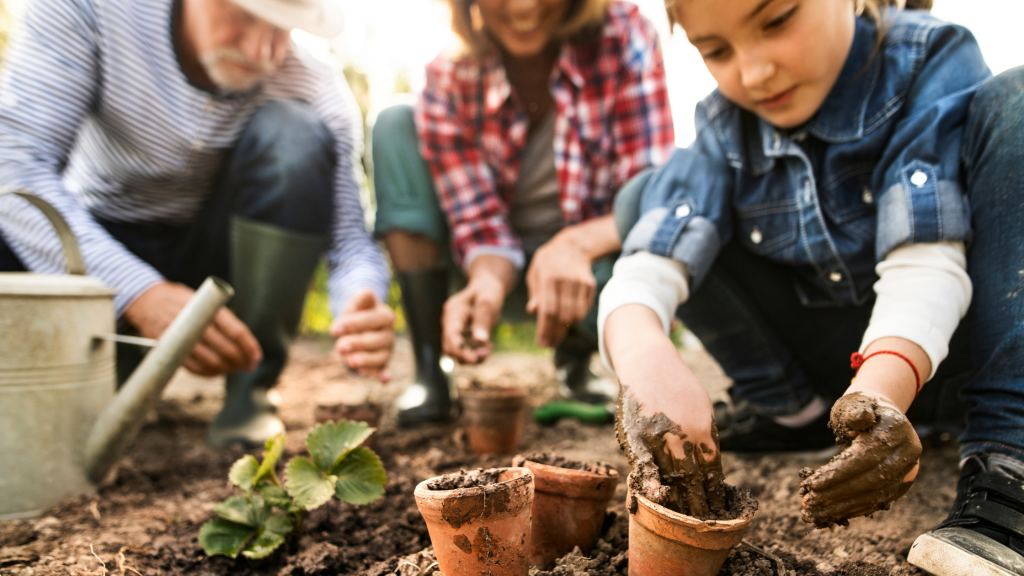
You can make a difference
Volunteers walk alongside refugee and immigrant neighbors in dozens of small and big ways. Creating change that lasts, and we are so thankful for each and every volunteer. From gardening to navigating new systems to sharing a cup of tea, volunteers show up and make a difference.
To our volunteers that have been along for the journey – thank you for your generous service. And to those not yet on the team – you too can be part of this community of volunteers moving forward together in welcoming our neighbors and making change that lasts.
Read more about the impact of volunteers and how ordinary moments create a movement of change in our Year In Review: 2021 Year in Review | World Relief Chicagoland Annual Report
Impact Report: Key Metrics from the 2021 Year in Review
This year, the World Relief Chicagoland community continues walking alongside immigrants and refugees throughout Chicagoland by providing vital services through a community of staff, volunteers, church partners, grant funders, business leaders, and other individuals.
In 2021, we remembered the African proverb: To go fast, go alone. To go far, go together.
These words inspired the theme of the 2021 Year in Review, our annual report. In the Year in Review, there is a central idea of ordinary moments creating a movement of change. With that in mind, we believe that the numbers we share are not themselves the impact. Rather, they are small indicators supporting the long-term change that we hope to see.
What is evidence of impact?
What is the value of welcoming immigrants and refugees? Of providing vital services, offering friendship, and connecting people within their new community? At World Relief Chicagoland, we believe this mission is important. Why? Because every person has immeasurable value. Above all, creating a welcoming community emphasizes the worth of each individual.
With that in mind, evidence of impact comes in many forms. It could be the success of a refugee working on job skills and gaining a career promotion. The pride of parents whose child graduated from high school. Or perhaps it’s a family able to save for their first house. It could even come from seeing someone building meaningful, lasting relationships within their neighborhood.
With that mindset, numbers are a very small part of the story. However, World Relief Chicagoland’s key program metrics do reveal something important. In fact, they show that through collaboration and community, we can accomplish far more together than anyone could alone.
Key Metrics
Together, in 2021, we created a movement of change – serving more than 6,500 people across Chicagoland. The needs are great. But so is our collective power for good. In fact, 2021 shows us that.
Thank You for Being a Partner in Impact…
- 1,547 volunteers invested their time
- 1,111 individual donors gave financially
- 120+ staff labored together to serve the community
- 220+ businesses joined in creating impact
- 20+ foundations funded programs for long-lasting change
…And Supporting Life-Changing Programs
- Immigration Legal Services served 2,859 people with legal information, counsel, and representation
- Immigrant Family Services reached 3,419 people with vital services in mental health and wellness, employment and career advancement, case management, children and youth, and more
- Education Programs equipped 511 people through English classes, technology support, and other skills
Read More
To learn more, check out World Relief Chicagoland’s 2021 Year in Review. This report showcases key metrics along with powerful stories. But most importantly, we believe that it reflects a bigger picture; a picture in which ordinary moments contribute to a movement of change.
Click here to read the Year in Review.
As you read, we hope that stories and metrics communicate evidence of change, that you see indicators of hope, and finally, that you walk away knowing the value of creating welcoming communities, together.
Because individual actions truly can create extraordinary impact.











